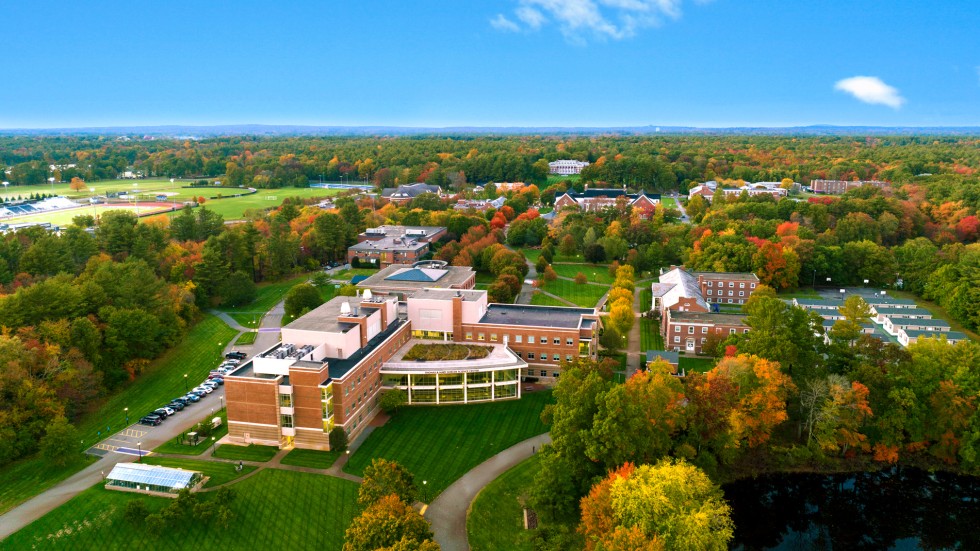Mission of the College
Stonehill College, a Catholic institution of higher learning founded by the Congregation of Holy Cross, is a community of scholarship and faith, anchored by a belief in the inherent dignity of each person.
Through its curriculum of liberal arts and sciences and pre-professional programs, Stonehill College provides an education of the highest caliber that fosters critical thinking, free inquiry, and the interchange of ideas.
Stonehill College educates the whole person so that each Stonehill graduate thinks, acts, and leads with courage toward creating a more just and compassionate world.
Philosophy of the College
To accomplish this vision students undertake a program of studies which encourages scholarship, critical analysis and creative thinking. Faithful to the Holy Cross tradition in education, Stonehill is committed to developing the moral, spiritual, intellectual and social competencies of its students, as well as fostering the determination to bring these competencies to bear on matters of social justice.
Through study of the core disciplines of the liberal arts, students engage the wisdom and the questions that are the foundation of an educated mind. Mastery of the specialized knowledge required by today’s professions provides the tools to lead productive careers and to shape the world beyond the classroom.
The presence of Catholic intellectual and moral ideals places the College in a long tradition of free inquiry, the engagement with transcendent theological and philosophical ideals and values, the recognition of the inherent dignity of each person, and the sense of obligation to commit oneself to moral ends.
In celebration of this dignity and of the unity of the human family, Stonehill supports a diversity of persons, opinions, and cultural and religious perspectives. The College affirms that appreciation of this diversity is integral to the acquisition of personal and intellectual breadth.
The faculty, inspired by a passion for teaching, collaborates with the staff to create a student-centered climate which promotes academic challenge and rigorous inquiry, physical well-being and emotional growth, personal responsibility, cooperative learning and authentic community. A Stonehill education encourages students to develop a lifelong desire for self-discovery and commitment to service that will lead to truly purposeful and rewarding lives.
History of the College
Stonehill College was founded on June 30, 1948. On that day, the Commonwealth of Massachusetts authorized the Congregation of Holy Cross to establish an institution of higher learning on the former estate of Frederick Lothrop Ames in North Easton. The campus is strikingly beautiful. At one end sits Donahue Hall, the estate’s original Georgian-style mansion, constructed in 1905. It houses Stonehill’s administration as well as a chapel in which mass is celebrated daily. Donahue Hall overlooks a panorama of academic buildings and residence halls in a tranquil setting of lawns, woods, fields and ponds.
Since its founding in France in 1837, the Congregation of Holy Cross has been engaged in works of education. By 1842, members of the Congregation had established the University of Notre Dame in northern Indiana. Other institutions of higher education founded by the Congregation in the United States include the University of Portland in Oregon, St. Edward’s University in Texas, King’s College in Pennsylvania, and Holy Cross College in Indiana.
Father Basil Moreau C.S.C., the founder of the Congregation, held as a primary concern that education affects the whole person. Father Moreau spoke and wrote of educating the heart as well as instructing the mind, of developing people of values as well as scholars. Typical of Moreau’s sentiments was the view expressed in an 1849 Circular Letter to members of the Congregation:
“We will always place development of the whole person side by side with the acquisition of knowledge; the mind will not be cultivated at the expense of the heart.”
In September 1948, Stonehill College enrolled its first students. In 1951, the College expanded enrollment to welcome women students. Stonehill conducted its first commencement exercises in 1952. In December 1959, Stonehill received full accreditation from and membership in the New England Association of Colleges and Secondary Schools (NEASC).
Until 1972, responsibility of the College was vested in the Eastern Province of the Congregation of Holy Cross. In that year, responsibility was transferred to an elected and primarily lay Board of Trustees. The Congregation also transferred equity consisting of 375 acres and buildings for, and accommodated to, educational purposes.
In 2017, in order to better define institutional identity, signal institutional selectivity, and anchor new undergraduate and master’s programs, the academic program was restructured into two schools: the School of Arts & Sciences and the School of Business.
Both the spirit and letter of the transfer called for Stonehill College to continue as a Catholic institution of higher learning.
As a Catholic College, Stonehill is committed to the mutually enriching discourse between intellectual inquiry and the life of faith. As a College in the Holy Cross tradition, Stonehill seeks to help students develop their abilities and discover the deepest longings in their lives. It seeks to cultivate concern for the dignity of every person and care for the victims of every prejudice. In fulfillment of its motto, lux et spes (Latin for “Light and Hope,”) the College fosters the competence to see and the courage to act. (Cf. Constitutions of the Congregation of Holy Cross, Nos. 14-17).
In this tradition, Stonehill is particularly concerned to foster a quality of life on campus that forges strong bonds of community and a tradition of service that contributes to a more just and compassionate society. In 1989, a Statement of Principles was approved by both the College and the Congregation of Holy Cross to ensure the preservation of Stonehill’s Catholic heritage and to commit the Congregation to an active presence in both academic and pastoral positions at the College.
|
